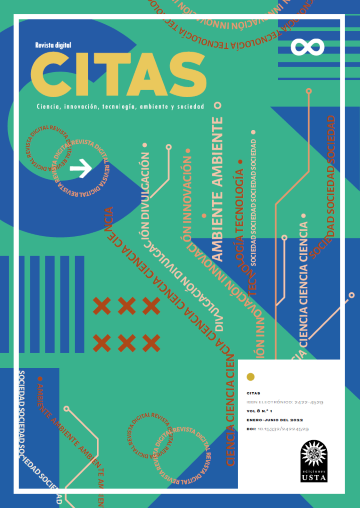Compromiso docente en tiempos de pandemia
Teacher commitment in times of pandemic
Abstract (en)
This article seeks to show the feelings and voices of those involved and the commitment that teachers have in these times of COVID-19 pandemic. The main objective is to reflect on the aspects that must be taken into account so that teachers today can comply with the teaching-learning process. First, it shows the overview, the feelings, the obstacles and the competencies that had to put into practice on the virtual methodology which, for multiple reasons, has not been able to consolidate the process with the required educational quality. Finally, within its conclusions, some arguments are presented in a reflexive way that lead to view the outlook that teachers all over the world are living.
Abstract (es)
Este artículo busca mostrar el sentir y las voces de los actores y el compromiso que tienen los docentes en estos tiempos de pandemia de covid-19. El objetivo fundamental es reflexionar sobre las aristas que deben tenerse en cuenta para que los docentes hoy en día puedan cumplir con el proceso de enseñanza-aprendizaje. En un primer momento, se muestra el panorama general, el sentir, los obstáculos y las competencias que han tenido que ponerse en práctica sobre la metodología virtual que, por múltiples razones, no se ha logrado consolidar el proceso con la calidad educativa requerida. Finalmente, dentro de sus conclusiones, se exponen de manera reflexiva algunos argumentos que conducen a hacer ver el panorama que viven los docentes de todo el mundo.
References
Abd, R. y Ngurah, G. (2010). The influence of culture on teacher commitment. Social Psychology of Education, 13(2), 185-205. https://doi.org/10.1007/s11218-009-9109-z
Atak, M. (2011). A research on the relation between organizational commitment and learning organization. African Journal of Business Management, 5(14), 5612-5616.
Cepal. (2020). América Latina y el Caribe ante la pandemia del Covid-19. Efectos económicos y sociales. Informe especial Covid-19. Cepal. https://repositorio.cepal.org/bitstream/handle/11362/45337/4/S2000264_es.pdf
Choi, P. y Tang, S. (2009). Teacher commitment trends: Cases of Hong Kong teachers from 1997 to 2007. Teaching and Teacher Education, 25(5), 767-777. https://doi.org/10.1016/j.tate.2009.01.005
Crosswell, L. y Elliott, B. (2004). Committed Teachers, Passionate Teachers: the dimension of passion associated with teacher commitment and engagement [Sesión de conferencia]. Australian Association for Research in Education (AARE) Annual Conference Melbourne.
Day, C. (2007). Committed for life? Variations in teachers' work, lives and effectiveness. Journal of Educational Change, 9(3), 243-260. https://doi.org/10.1007/s10833-007-9054-6
Gupta, M. y Kulshreshtha, P. (2009). Professional Commitment of the primary school teachers. The Primary Teacher, 34(3), 80-86.
INEE. (2019). Panorama educativo de México: Indicadores del Sistema Educativo Nacional. INEE.
INEGI. (2018). Encuesta Nacional sobre la Disponibilidad y uso de TIC en hogares. INEGI. https://www.inegi.org.mx/temas/ticshogares/
Klassen, R. y Ming, C. (2010). The Occupational Commitment and Intention to Quit of Practicing and Pre-Service Teachers: Influence of Self-Efficacy, Job Stress, and Teaching Context. Comtemporary Educational Psychology, 36(2), 143-129. https://doi.org/10.1016/j.cedpsych.2011.01.002
Nias, J. (1981). Commitment and motivation in primary school teachers. Educational Review, 33(3), 181-190. https://doi.org/10.1080/0013191810330302
Repromag. (2020). Red Autónoma de Profesores y Profesoras de Magallanes. Encuesta. https://elpinguino.com/noticia/2020/04/29/encuesta-revela-que-75-de-los-profesores-no-han-recibido-capacitacion-para-clases-online-
Tang, S. y Choi, P. (2011). Compromiso satisfecho e insatisfecho: docentes en tres generaciones. Australian Journal of Teacher Education, 36(7), 44-75.
Unesco Iesalc. (2020). Covid-19 y educación superior: de los efectos inmediatos al día después. Análisis de impactos, respuesta y recomendaciones. Unesco. http://www.iesalc.unesco.org/wp-content/uploads/2020/04/COVID-19-060420-ES-2.pdf
World Economic Forum [WEF]. (2020). 3 formas en que la pandemia de coronavirus podría remodelar la educación. https://elliderimperfecto.com/2020/04/01/3-formas-en-que-la-pandemia-de-coronavirus-podria-remodelar-la-educacion/
How to Cite
License
The authors sign a transfer of rights so that Universidad Santo Tomás can publish the articles under the conditions described below. The authors, readers and other users are free to share, copy, distribute, perform and publicly communicate the work under the following conditions:
-
Attribution — You must give appropriate credit, provide a link to the license, and indicate if changes were made. You may do so in any reasonable manner, but not in any way that suggests the licensor endorses you or your use.
-
NonCommercial — You may not use the material for commercial purposes.
-
ShareAlike — If you remix, transform, or build upon the material, you must distribute your contributions under the same license as the original.
No additional restrictions — You may not apply legal terms or technological measures that legally restrict others from doing anything the license permits.
CITAS is licensed under Creative Commons Attribution-NonCommercial-ShareAlike 4.0 International (CC BY-NC-SA 4.0).

Until 2019 the documents published in the magazine were under the Creative Commons Attribution-ShareAlike license (CC BY-SA), however, in order to guarantee the open and free distribution of the content published in the magazine, it was decided to change the type Commons Attribution-NonCommercial-ShareAlike 4.0 International license (CC BY-NC-SA 4.0)






